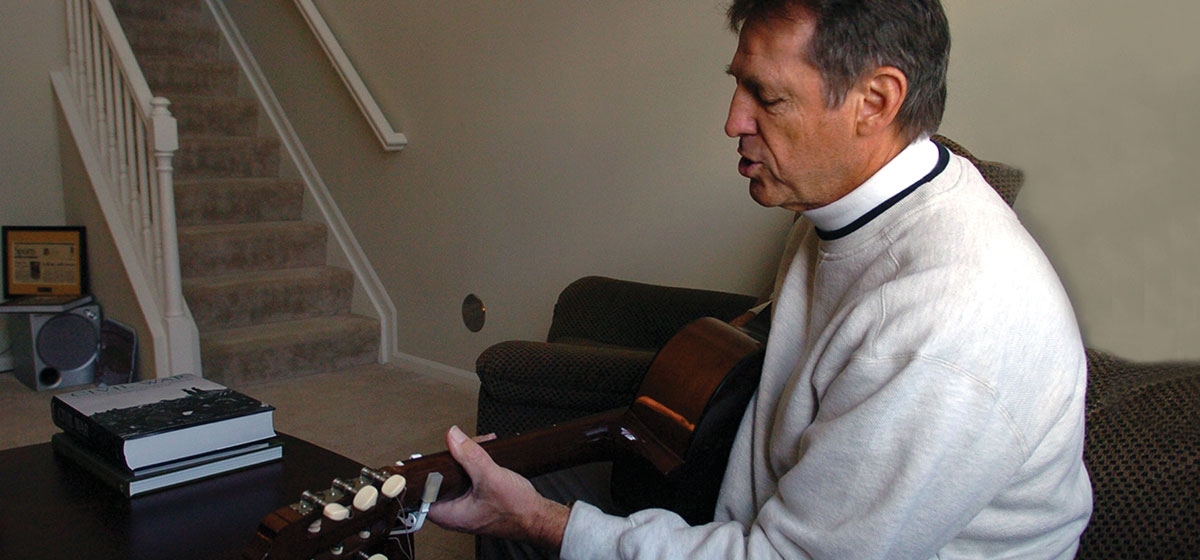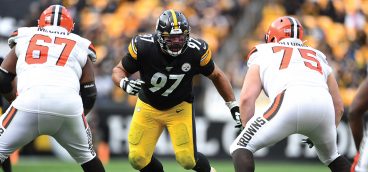Last of the Romantics

Maybe there never was anything even remotely innocent about football, and to be clear, that’s just an introductory reflection, not a lament on any recent spasm of cheerleader high jinks, or low jinks as the case may be.
But if football ever had an age of innocence, it’s ancient enough to have ended prior to the release of the film “Horsefeathers,” in 1932.
The Marx Brothers, after all, scouring the vicinity of Huxley College for a couple of able footballers in that little Depression Era epic, went first to a speakeasy, and even though Zeppo eventually celebrated a Harpo touchdown in the big game against Darwin by slapping the bro’ on the back and yipping, “Oh that’s marvelous!”, the essential nastiness of this sport has been perfectly evident even to cultural powerbrokers for more than 70 years.
That’s why you’ve got to be grateful for Dick LeBeau.
Sixty-eight years on the planet, 47 in the ferociously competitive National Football League as a player and a coach, and now eight with the Steelers in two separate ultra-strategical deployments somehow have not so much as flaked the bedrock mid-American innocence of Charles Richard LeBeau.
Known in these parts mostly as the architect of defensive systems that helped take Bill Cowher’s team to the Super Bowl a decade ago and could well take it back, LeBeau continues to combine a militarist’s tactical aptitude with the nurturing calm of a spring evening in small-town Ohio.
In a game whose video image and contemporary soul is dominated by raging megalomaniacs on the sidelines and screeching narcissists between them, LeBeau is a soft breeze warming a freshly painted gazebo in Anytown, USA.
No such study has been done, but it’s a good bet that a clinical 98 percent of football coaches would bristle at being called a romantic. Among football coaches old enough to have learned the brutal art of it at the knee of Pattonesque former Ohio State coach Woody Hayes, as LeBeau did, the percentage would doubtless be higher.
And though Dick LeBeau isn’t called one, he is one: a romantic. “Unquestionably,” he said. “Incurably.”
This was on a recent Wednesday, in a conversation in the Steelers’ cafeteria, where LeBeau reflexively avoided the presumption that he has anything interesting to say, but not the notion that the questioner is possibly the more interesting person in the dialogue. It’s another modern sports dynamic that he turns completely upside down, and it is completely false. LeBeau is the most interesting guy in most any room, at least any room in which you can shove aside his humility.
“When you’re shooting pool in a Philippine jungle with Michael Caine, and you’ve come from a town of 7,000,” LeBeau said, “well, I guess something’s gone right.”
There, that’s better.
So yes, there’s that Michael Caine story, among his hundreds. LeBeau was Caine’s stunt double in the 1970 film “Too Late The Hero,” and for someone who’d grown up in an almost childlike wonder of the movies (“The Wizard of Oz” remains his favorite), a fleeting role in “Too Late The Hero” is prominent among the badges of honor LeBeau never seems to wear even figuratively.
“Robert Aldrich, the director, was a big football fan, and he was really hot at the time,” LeBeau remembers. “He’d directed ‘What Ever Happened To Baby Jane’ and ‘The Dirty Dozen.’ Anyway, Michael Caine and Cliff Robertson were supposed to be running from a Japanese officer, across this open space. Aldrich knew it was going to be 98 degrees out there and we’d be out there for three weeks or more, so he started looking for athletes, mostly for their endurance. I was Michael Caine in that scene, and Robertson was played by [former NFLer] Pat Studstill.”
In Leonard Maltin’s 2005 Movie Guide, the capsule review (three stars) of the film describes “two reluctant soldiers (Robertson, Caine) sent on a suicide mission on a Pacific island during WW2.”
To Dick LeBeau, it probably doesn’t seem that long ago that people who’d been sent on suicide missions were at least presumed to be reluctant, just as he can’t seem too far removed from a time when, if you told somebody you played both ways at Ohio State, no one mistakenly figured you to have something in common with Sheryl Swoopes.
But the narrative surely stretches a long, long way back to London, Ohio, the town 100 minutes southwest of Columbus and 100 miles deep in mid-20th century Americana. LeBeau’s idea of a football dynasty is the 1951 London High Red Raiders, quarterbacked through a sun-speckled autumn by his older brother Bob. Their father, an accountant, worked as an auditor for the state for 40 years.
“As auditors do, he liked things to balance at the end of the day,” LeBeau said. “He was very principled. He thought honest was the best thing you could be, and that your name was the best thing you had.” Though his father died 10 years ago, his mother, now 92 and still in London, hangs on every Steelers snap to this day, even to the other side of midnight if Monday Night Football makes it necessary.
“She’s proud of him,” Brandon LeBeau said into a cellphone on an Ohio-to-Pittsburgh drive for a recent Steelers game. “And he’s proud of her. She’s such a trooper.”
Brandon LeBeau, 27, only son of Dick and Nancy LeBeau, worked for his dad for a time while Dick was head coach of the Cincinnati Bengals. One of his primary roles now is to recommend, screen, collect, and arrange some viewings of contemporary films, the kind his dad rarely has time to enjoy in a profession that has steadily devolved into 28-hour work days.
“In the off-season he’ll go on these little DVD-buying sprees, bring home five or six and order up a pizza,” Brandon said. “It’ll be mostly older films, like ‘The Great Race’ (1965), or something with Peter Lorre. But we’ve watched ‘Collateral.’ That’s the kind of film he talks to the players about.”
There was a period when he was merely one of the game’s great defensive players (his 62 interceptions from 1959 until 1972 are still a Detroit Lions record, and his 171 consecutive starts at cornerback an NFL best), when there wasn’t much about the movies Dick LeBeau didn’t know.
“Do you know where we got the word ‘Oz’?” he asked recently. “Frank L. Baum noticed that one of the drawers of a filing
cabinet was labeled ‘O to Z’. That’s probably my favorite (he can recite entire passages), but I like anything with John Wayne, Steve McQueen, Charles Bronson, any classic Bogart — ‘The Maltese Falcon.’”
Lotta tough guys there for an incurable romantic.
“Well, I like Clark Gable, too, but I don’t know what you’d call him. And Alan Ladd, who was only 5-4. When he was opposite Sophia Loren (“Boy On A Dolphin” — 1957), he had to stand on a box.”
There is a conspicuous omission here, it turns out.
“James Dean is his all-time favorite,” Brandon said. “Dean is his guy. That’s always been a fall-back position for me. If you can’t think of something to get Dad, you can always pick up a James Dean calendar or something.”
James Dean’s Porsche crashed and killed him three weeks after Dick LeBeau’s 19th birthday. Dean made only three films, but his “Rebel Without A Cause” persona became iconic, and the actor lives as some indelible symbol of youthful alienation and rebellion. It wasn’t the kind of persona you brought to Hayes’ 1956 Ohio State national championship team, so it doesn’t really reconcile itself in a LeBeau profile, except perhaps as a symptom of acute broad-mindedness.
LeBeau’s intense interest in the movies has active parallels in his love for music, for golf, for performance, for life.
“It’s certainly not inaccurate to call him a romantic,” Brandon said. “But the term I always think of is modern-day Renaissance Man. As much as he’s into films, he’s even more into music. He’s played the guitar for as long as I can remember. When he was a player with the Lions, he was on the Bob Hope NFL Stars Variety Show. He and a teammate, Joe Schimdt, even made a record. By the time I found it, we didn’t have a record player any more. He’s very gifted musically. He can listen to a CD, write it out on a chart, and teach himself to play it. But he’s had no formal training that I’m aware of. He can play a wide range of things. He’ll play Springsteen songs, songs by Merle Haggard. There was a group that was popular when I was in high school, the Samples. He even learned some of their stuff.”
Seasonally, golf throbs just as intensely on another parallel. LeBeau plays often enough and well enough to have once made holes in one seven days apart, one at Diamond Run in the North Hills, the second near Cincinnati. While most of his modern players might be only slightly aware of LeBeau’s other interests even as they revere him as one of the game’s great contemporary strategists (Steelers linebacker Larry Foote, lunging for appropriate metaphors, once said of LeBeau: “It’s a chess match out there, and he’s always ahead of the 8 ball”), all of them know him equally as much for an annual ritual in which he recites from memory, in the locker room, “The Night Before Christmas.”
“It’s outstanding!” said Steelers Chairman Dan Rooney. “And the players, you figure, well, they’re not going to pay any attention, but they love it! He doesn’t read it, he just does it. He feels it. I guess you could say he’s somewhat idealistic. I think that captures him.”
In his football life, it is probably enough that LeBeau is widely recognized for his inspired, innovative strategies and his ability to communicate the intricacies of one of the league’s most sophisticated defenses (coming into this season, Cowher’s career record was 79-33 with LeBeau on his staff, 50-44-1 without him), but what stuns the game’s long-time observers is the durability and adaptability of his communication skills.
How in the world can Dick LeBeau relate to athletes two generations and 12 sensibilities removed from his idyllic mid-American launch coordinates?
“I’ve lived their life,” he says. “I’m blessed because we have this common denominator in that the essence of the game hasn’t changed. Knute Rockne, with a few adjustments, could be as successful a coach today as he was at Notre Dame. I’m a bridge for these guys to those times. I’m seeing the same things. I’ve lived their life. Athletes haven’t changed that much. They’re proud of themselves and proud of their families.”
That, of course, is too easy. Dick LeBeau hasn’t lived Joey Porter’s life, growing up in Bakersfield, Calif., in the ’80s, taking a bullet in the buttocks outside a Colorado night club, playing a game so fast and violent that players like him and Larry Foote now know the modern football theater somehow requires a steady stream of trash talk between the huddles.
“You can call him an idealist, even a romantic, but you have to throw in a little realist too,” said Steelers assistant coach Darren Perry, who has both played for and coached with LeBeau. “He knows what the game is and what it means and how it relates to real life and the harsh realities of real life. He understands that there are going to be outside factors that can affect you psychologically, and that are going to affect your mental approach, and players respect him for it, as opposed to a coach who’ll say, ‘you didn’t do that what was expected, and I don’t care why you didn’t do it, I only know you didn’t.’”
But the harsh reality of LeBeau’s professional life is that his communicative magic, strategical genius, and athletic superiority have been consistently lauded but never historically validated. He has never worn a championship ring. He is not, though it is likely a miscarriage of logic, in the Hall of Fame.
“He’s one of those guys you talk about all the time that really, really should be in there,” said Rooney of the Canton shrine that has honored both him and his father. “Just for (the scope of) his participation, and the fact that he’s been successful at everything.”
LeBeau would never second that opinion out loud. That wouldn’t be him.
“I’m a Midwestern guy who thinks that if there’s a guy walking around saying, ‘I should in the Hall of Fame,’ you know, there’s something wrong with that person,” LeBeau said. “To me the Hall of Fame is my little town. They put my name on the corporate sign at the edge of town, ‘Home of Dick LeBeau.’ To me, that’s the supreme compliment. I have a picture of me and my mom by that sign.”
Such is LeBeau’s essential Oz-quest, which is not, as we’ve all learned, for Oz, but for home. Home is where he remembers going to his grandparents and Christmas time and stringing popcorn and absorbing the kind of simple virtues that have sustained him across the decades.
“I know there aren’t a lot of people my age who believe in Santa Claus, but I do,” he said. “There is a Santa Claus. He exists in all our hearts. It’s always been that way.”
If all you could say about football today was that it’s long had a place in its dark, cold heart for someone like Dick LeBeau, that would be enough to encompass all that’s good about it.





